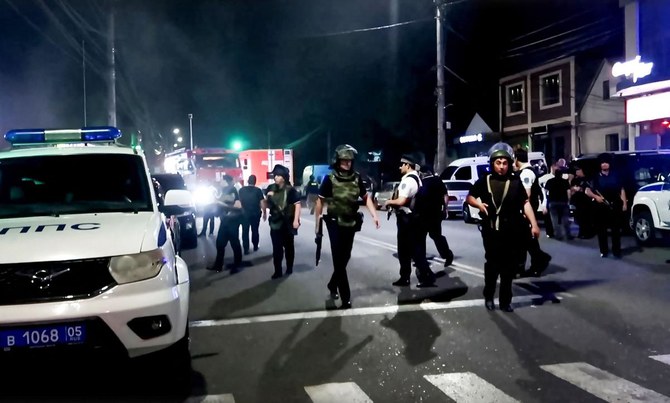
After gunmen strike Dagestan in Russia, the death toll rises to 20
In Dagestan, a predominantly Muslim part of Russia, the number of fatalities from a string of egregious shootings at churches and synagogues increased to 20 on Monday with gunmen going on the rampage in two of the major cities of the republic.
Sunday night in the ancient city of Derbent, gunmen armed with automatic guns broke into an Orthodox church and a synagogue, killing 66-year-old Orthodox priest Nikolai Kotelnikov and setting an icon at the church on fire.
Approximately 125 kilometers (75 miles) north of the Caspian Sea coast, in the city of Makhachkala, gunmen ambushed a church and opened fire on a traffic police post.
Around Makhachkala’s Assumption Cathedral, gunfights broke out, and heavy automatic gunfire continued late into the night. Residents could be seen fleeing for cover as smoke plumes rose above the city in the footage.
No one took immediate credit for anything. According to Russia’s inquiry committee, four civilians and fifteen police officers perished. The ministry of health in Daghazstan reports that 46 more people suffered injuries.
Five attackers were slain, several of them were captured on camera by the local media being shot dead on a sidewalk.
The head of Dagestan, Sergei Melikov, visited the attacked synagogue and church in Derbent on Monday. “This is a day of tragedy for Dagestan and the whole country,” he stated.
He indicated that the attack had been planned by foreign troops, but he did not elaborate.
“This is an attempt to cleave apart our unity.”
Dagestan declared a three-day mourning period. On the street, crimson carnations lined up alongside photos of the fallen police officers.
President Vladimir Putin expressed his sympathies to the families who lost loved ones. Putin has long accused the West of attempting to incite secession in the Caucasus.
A patchwork of ethnic groups, languages, and geographical areas, Dagestan is a predominantly Muslim republic located in Russia’s North Caucasus, sandwiched between the Caspian and Black Seas under the shadow of the Caucasus mountains.
DAGESTAN
Three months after a deadly incident in Moscow, concerns that Russia may be facing a new, militant Islamist danger were heightened by the attack on sites of worship for Christians and Jews.
The Islamic State claimed responsibility for the 145 fatalities that occurred at the Crocus concert hall in Moscow during its attack.
Following the outbreak of the Gaza War in October, Palestinian flag-waving protesters burst down glass doors and stormed through Makhachkala airport in search of Jewish passengers on a flight from Tel Aviv.
According to a spokeswoman, UN Secretary-General Antonio Guterres expressed his sympathies and denounced the attack.
One of the world’s oldest cities still in continuous occupation, Derbent is also a UNESCO World Heritage site and the site of a historic Jewish community.
The attack was labeled as “terrorist” by Russian investigators, who withheld information about the perpetrators.
According to law enforcement, two sons of Magomed Omarov, the head of the Sergokala district in central Dagestan, were among the attackers in Dagestan, according to Russian official media. State media reported that they were dead and that their father was being held.
According to Melikov, Dagestan has declared June 24 and 26 to be days of mourning. All entertainment activities have been canceled and flags have been lowered to half-mast.
In the late 18th and early 19th centuries, the Russian empire grew into the Caucasus; nevertheless, with the collapse of the Soviet Union in 1991, an uprising resulted in two conflicts.
Prior to the Second Chechen War, the Russian military launched a significant bombing campaign in August 1999 when Chechen fighter Shamil Basayev led fighters into Dagestan in an attempt to support Dagestani Wahhabist radicals.
All Categories
Recent Posts
Tags
+13162306000
zoneyetu@yahoo.com



